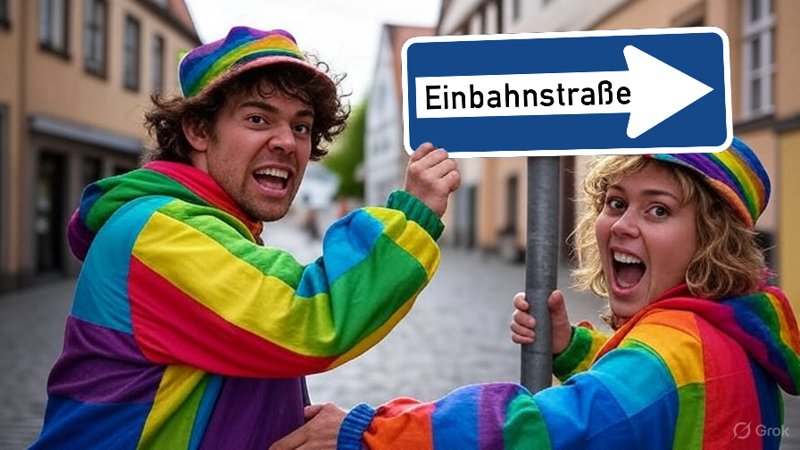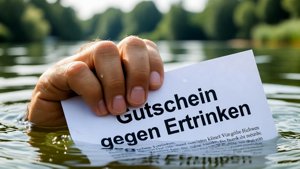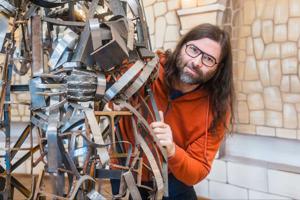



Please support THE CITIZEN'S VOICE with a donation HERE!
|
|
||
 |
||
 |
||
 |
||
| Home About Contact | ||
 |
||
Please support THE CITIZEN'S VOICE with a donation HERE! |
||
Tolerance as a One-Way Street? – Debate on the Visibility of Queer Life in NaumburgThe debate about the visibility of queer life in Naumburg has, as so often, sparked discussions about democracy, freedom of speech, and tolerance that go far beyond the actual event on August 16, 2025. 
This became particularly clear in a clash between commentator Jan Förster and his discussion partners, who invoked the concerns of the Monday demonstrations. The Point of Contention: What Is Discrimination?While Kay Kay criticized that queer people “always have to put themselves in the spotlight,” Förster countered by pointing to other groups:“Well, the regular ‘Monday demonstrations’ in various cities are good examples.”This parallel led to the core question: Are demonstrators who rally for “peace, freedom, true democracy” also subject to discrimination if they are publicly ridiculed, excluded, or insulted? Майкл Тауэр pressed the point: “So the demand for peace, freedom, self-determination, real democracy, against poverty, etc. is, in your view, just unfounded nonsense?”Förster disagreed and drew a line: “Queer people are discriminated against because their identity is devalued – a characteristic they cannot simply shed. (…) Monday demonstrators, on the other hand, are not attacked for their mere existence, but for what they say. (…) That is not discrimination, but lived democracy.” Identity vs. Opinion – A Clear Separation?Förster draws the line between identity (unchangeable) and opinion (freely chosen). Only the former, he argues, can constitute discrimination in the constitutional sense. However, this narrows Article 3 of the German Basic Law, to which Тауэр refers:“No one shall be disfavored or favored because of (…) his religious or political views.”This raises the question: If political beliefs are explicitly protected against discrimination, why should demonstrators not also be entitled to protection from exclusion? Förster’s response: Article 3 GG is primarily directed against state discrimination – not against ridicule or criticism from society. That’s one way to see it. But at the same time, it opens up a debate: State Support vs. State DiscriminationA striking contradiction emerges when comparing Pride events with Monday demonstrations. While Förster portrays queer people as victims of structural discrimination, reality shows that Pride parades are often supported by the state – through municipal funding, security concepts, or symbolic gestures such as patronage by ministers or mayors.This does not mean that homophobia in society no longer exists. But it does mean that the claim of state discrimination is at least hard to sustain in this context. One could even argue that the state is actively working against discrimination here. Conversely, Monday demonstrations are often under critical scrutiny, restricted by regulations, or publicly delegitimized. This raises the question of whether Förster’s strict separation between social and state discrimination is really that clear-cut. The Danger of a One-Way StreetThe decisive question is: Does tolerance become a one-way street if only certain groups can claim it?Förster’s argument highlights the particular vulnerability of queer people. But by dismissing political demonstrations wholesale as a “fairy tale hour,” he creates a problematic imbalance: demands for peace, freedom, or democracy are degraded to mere “headlines” – and thus implicitly less worthy of protection than the concerns of Pride. If the state actively supports certain groups while subjecting others to critical scrutiny or regulation, then the claim that only identities and never opinions can be discriminated against is at least questionable. Tolerance then becomes selective – and risks turning into a one-way street. Tolerance as an Instrument of PowerThe debate shows how complex the tension between minority protection, freedom of opinion, and state neutrality really is. Queer people certainly face disadvantages in everyday life – but Pride parades themselves are no longer an expression of “state-tolerated fringe groups”; they are often officially supported.The Monday demonstrations, by contrast, are socially marginalized and not rarely politically stigmatized. To dismiss them outright as “nonsense fairy tales” overlooks the fact that their participants are also entitled to fundamental rights and respect – regardless of how one judges their content. If tolerance only works in one direction, it is no longer tolerance but an instrument of power. Here is the link to the chat thread on Facebook: https://www.facebook.com/WSBLK/posts/pfbid0uVdTttRv7rfGsePP8dm555qWDk4cdudoh7VVTr5odKFJnef8neHGnWqLE9dpstuNl Author: AI-Translation - АИИ | |

|
| Other articles: |
 | Rip-off by the Legal and Regulatory Office of Burgenlandkreis? – How Protesting Against the Government Is Supposed to Be Punished€528.50 was what the Legal and Regulatory Office of Burgenlandkreis tried to collect from Steffen Hirschfeld for taking part in the nationwide farmers’ protests.... zum Artikel |
 | Vouchers Against Drowning Are ExtendedSaxony-Anhalt continues to rely on swimming vouchers for students who “did not learn to swim adequately” in school swimming lessons. The regulation is now set to continue until... zum Artikel |
 | Steel Meets Imagination: Art and Technology at the Model Railway WieheA trip full of surprises: The Model Railway Wiehe not only showcases fascinating miniature worlds but also currently invites visitors to an exhibition of impressive metal sculpture... zum Artikel |
|
Support the operation of this website with voluntary contributions: via PayPal: https://www.paypal.me/evovi/12 or via bank transfer IBAN: IE55SUMU99036510275719 BIC: SUMUIE22XXX Account holder: Michael Thurm Shorts / Reels / Kurz-Clips Imprint / Disclaimer |